- Could Your Grocery Store Meat Be Causing Recurring UTIs?
- Are You Making This Expensive Thermostat Error This Winter?
- Recognizing the Signs of Hypothyroidism
- 10 Strategies to Overcome Insomnia
- Could Artificial Sweeteners Be Aging the Brain Faster?
- Techniques for Soothing Your Nervous System
- Does the Water in Your House Smell Funny? Here’s Why
- Can a Daily Dose of Apple Cider Vinegar Actually Aid Weight Loss?
- 6 Health Beverages That Can Actually Spike Your Blood Sugar
- Treatment Options for Social Anxiety Disorder
Biden Administration Could Reclassify Marijuana as Less Risky Drug

The Justice Department has recommended that marijuana be reclassified as a less dangerous drug, a move that signals a significant shift in U.S. drug policy.
The proposal, first reported Tuesday by the Associated Press, still has a long way to go before it becomes official policy: First, it has to be reviewed by the White House Office of Management and Budget (OMB). Then, it will have to go through a public comment period and be reviewed by an administrative judge.
If made a final rule, the new policy would recognize the medical uses of cannabis and acknowledge it has less potential for abuse than the most dangerous drugs. What it wouldn’t do is legalize marijuana for recreational use.
“Today, the Attorney General circulated a proposal to reclassify marijuana from Schedule I to Schedule III,” Justice Department Director of Public Affairs Xochitl Hinojosa said in a statement, the AP reported. “Once published by the Federal Register, it will initiate a formal rule-making process as prescribed by Congress in the Controlled Substances Act.”
After the OMB signs off on the proposal, the U.S. Drug Enforcement Administration will take public comment on the plan to move marijuana from a Schedule I drug, alongside heroin and LSD, to a Schedule III drug, alongside ketamine and some anabolic steroids. That follows a recommendation made last year by the U.S. Department of Health and Human Services.
President Joe Biden first called for a review of federal marijuana law in October 2022 and pardoned thousands of Americans convicted federally of simple possession of the drug. He has also called on governors and local leaders to take similar steps to erase marijuana convictions.
Public support for the easing of restrictions on weed is at an all-time high: Last fall, a Gallup poll found 70% of adults support legalization, the highest level yet recorded by the polling firm.
Importantly, Schedule III drugs are still controlled substances and subject to rules and regulations, and people who traffic in them without permission could still face federal prosecution, the AP reported.
Jack Riley, a former DEA deputy administrator, told the AP he had concerns about the proposed change because he thinks marijuana remains a possible “gateway drug.”
“But in terms of us getting clear to use our resources to combat other major drugs, that’s a positive,” Riley added, noting that fentanyl alone accounts for more than 100,000 deaths in the United States each year.
Federal drug policy has lagged behind many states in recent years, with 38 having legalized medical marijuana and 24 legalizing its recreational use.
More information
The National Institute on Drug Abuse has more on marijuana.
SOURCE: Associated Press
Source: HealthDay
Copyright © 2026 HealthDay. All rights reserved.










